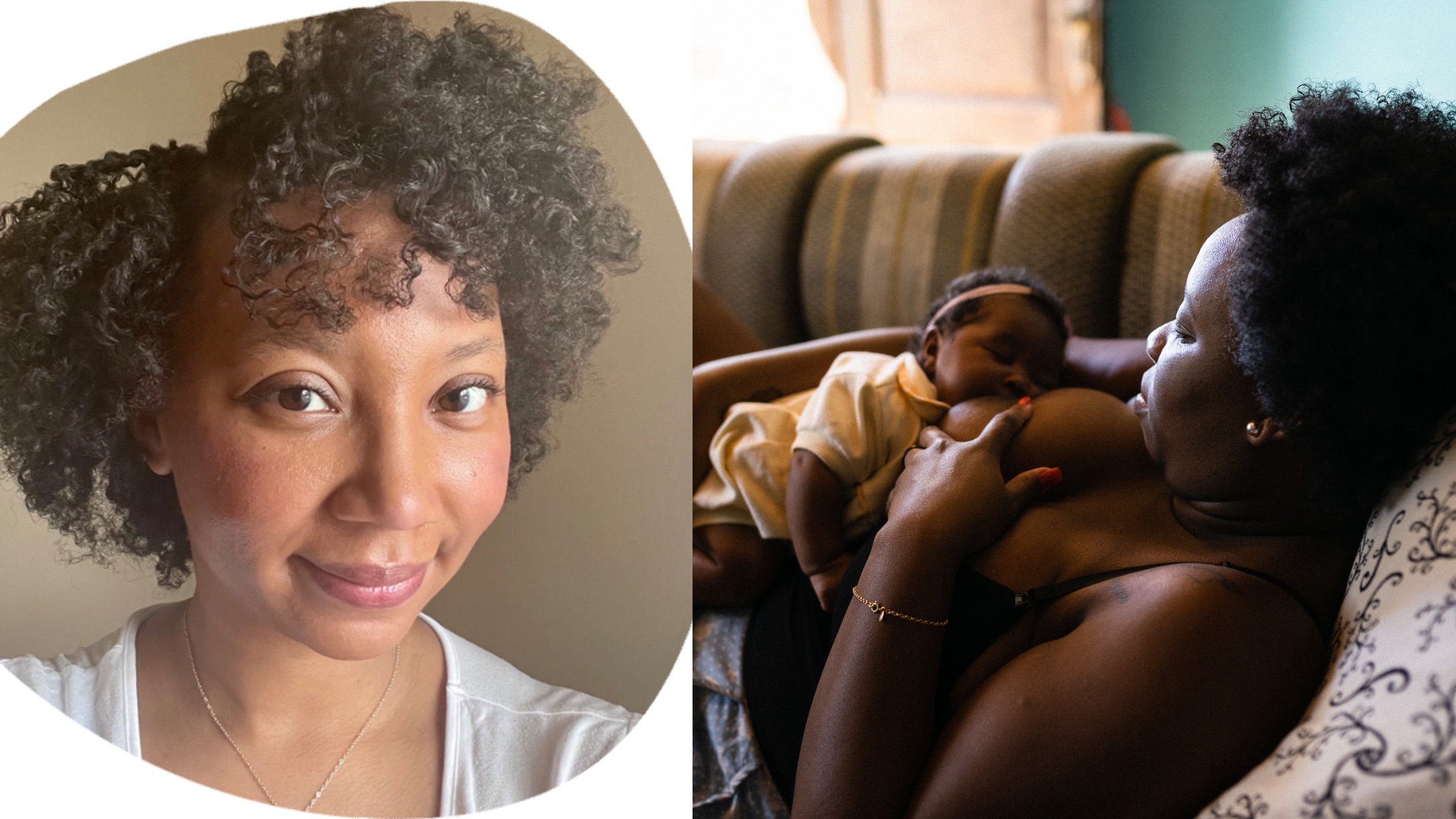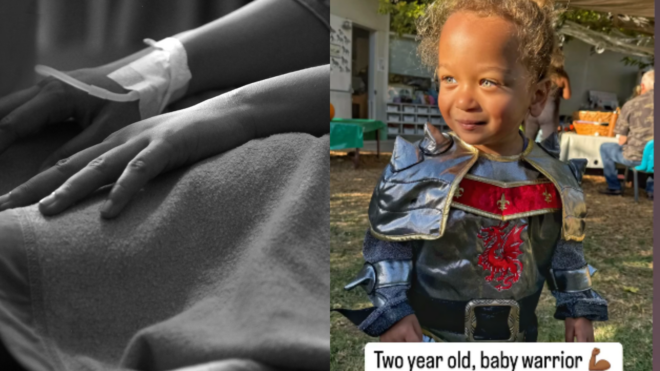
On her Instagram page, Erika Dudley wears a shirt that reads "first generation breastfeeder." Dudley was one of the first women in her family to get back to the practice of feeding her son with something produced by her body instead of with formula. Black parents like Erika have lower rates of breastfeeding than their white counterparts, with breastfeeding at 69.5% compared to 85% of white parents, according to the Centers for Disease Control and Prevention.
After breastfeeding her son for three years, Erika wanted to share her passion for nursing with other mothers. With that in mind, she earned her International Board Certified Lactation Consultant certification. As one of fewer than 10 Black lactation consultants out of hundreds in Indiana, her experience and cultural competence is greatly needed.
Erika belongs to the Nest Collaborative, a network of board-certified lactation consultants who offer specialized training to provide information on safe infant feeding practices.
We spoke to Erika about her work as a lactation consultant, how history affects breastfeeding rates among Black women today, and how her approach helps Black women take on a breastfeeding journey more confidently.
Can you speak to some of the reasons why breastfeeding is considered taboo in the Black community?
"[We can] look back as far as slavery with Black women being wet nurses. In this day and age, we wanted to take back some autonomy. People my parents’ age, who were raised in the '50s and '60s, that’s around the timeframe formula was heavily marketed and specifically targeted toward the Black community," Erika tells us.
"It could be seen that breastfeeding was what poor people did. And if I had enough affluence or money, then I would be able to pay for this new milk, this product to be able to feed my child," she continues. "It also allowed Black moms to be able to go into the workforce. We didn’t need to be stationary to nurse a baby. Pumps were not a thing back then. If they were, they weren’t like the wearable pumps that we have now.
"It’s also through the lens of our bodies being heavily sexualized. So we have that type of hesitation that if I’m putting my baby to the breast, what’s the perception of that? How will my body respond to that type of feeding choice? We also have to consider doing this long-term and whether or not it is sustainable. Breastfeeding might be fine in the context of the hospital, but once I’m home, if I have other responsibilities it might not be sustainable for me to think that I’m going to nurse this baby on their schedule versus mine," Erika explains.
"In the 50s and 60s, we had very large families. My grandmother had nine kids. We have large families. So if those births are really close together, that’s also going to play a part in how long I can breastfeed. And there were also medications that were provided right in the hospital, at delivery, that were intended to dry milk production up," she says. "There was a time when that option wasn’t explained. It was just given. It was protocol, if you will. So that mother may assume, ‘My milk never came in’ without realizing it was intentional that your milk didn’t come in based on the health care system. So there’s that lack of knowledge, what can my body do without any type of intervention." she adds.
“Even now, I have teen moms that are Black, Indigenous or Hispanic and they’re not really given the options. They’re filtered into getting a Depo shot or some type of early pregnancy prevention intervention,” Erika says, nothing that these medications interfere with the body’s natural hormones and can affect milk production. “Offering these options without explanation removes the autonomy without having the information about what this could potentially impact after that.”
Why is it important to have a lactation consultant who is culturally competent?
"When we pop on the screen or when we walk in the room and say, ‘I’m your lactation consultant,' there’s a shift in the energy. The shoulders relax. They don’t have to code switch. That goes out the window. I’ve had clients who hop on the screen and they’re apologizing because they’re in the middle of getting their braids done because time ran over," Erika says. "That’s not something you would necessarily feel comfortable doing with somebody who doesn’t look like you. I get it. [That mom is thinking] I’m not going to push back getting these box braids because I need to do x, y and z. But I also value this information of being able to care for my kid.
"It’s nuanced things that can’t be replicated no matter how much [diversity and inclusion] training or how many Black people you’ve hung around. It’s the way that we’re able to understand things. It’s very common, for example, that the grandmother on the maternal side have some kind of influence on their daughter’s feeding choice. So if we can’t relay why breast milk is important, without it applying shame to that grandparent no matter what we say in that consult, if that family member is not on board, it’s going to be that much more difficult for that mom to get to that goal," Erika tells us.
"I like to explain that support looked very different in the '50s, '60s, '70s compared to now. So we can’t compare oranges to apples. But in general, if dad or the grandmother doesn’t understand why this is such a big deal, why are you putting yourself through this? If they’re having a challenging time, trying to get over a hump, it’s a knee-jerk reaction to say, ‘Just give the baby a bottle. Give them formula.’ That undermines not only their feeding choice but it undermines that confidence in their body being able to do this thing," Erika asserts.
"We want to explain that through breastfeeding we’re investing in the health of the baby, of mom, and a generational shift that can occur from being provided this milk."
Can you explain the barriers Black women face in having access to lactation consultants?
"In general, the No. 1 barrier is having someone who looks like you," Erika suggests. "And Indiana is a reflection of everywhere. We have doctors, OBs, pediatricians that undermine the feeding choice. They remove the option to breastfeed because they come in with assumptions. ‘Well, based on what I’ve read or what I’ve heard or seen, Black moms/Black parents don’t breastfeed their children so I’m not going to even introduce it because I don’t want them to feel shame if they say that they’re not going to do that.’ They don’t give them the option of prenatal education," she says.
"I always like to say, ‘Education isn’t instruction.’ Education allows you to have more options whether you choose to breastfeed or not. That type of prenatal class or consult can help you get a sense of what breastfeeding can look like for you. I think that’s another barrier. We see or think of breastfeeding in one way. The mom latches the baby. They’re stationary at home," she shares.
"But we like to explain that breastfeeding can look very customizable, however you want it to look. That may be exclusively pumping and bottle feeding. It could be combo feeding where you’re producing milk and you’re formula feeding. It could be exclusively latching the baby or it could change when you return to work," Erika details.
"So if we don’t have the chance to explain, they’re restricted in how it could look. If they only have the representation of a baby nursing with a mom’s face scrunched up, if when I think about breastfeeding, I automatically think pain," she says. "That’s one of the first questions I ask during prenatal consults — 'What have you heard about breastfeeding?' It’s never anything joyous or it’s such this great empowering thing. It’s trauma. So we have to redirect that."
During slavery, Black women were responsible for feeding their enslavers' children. I’m wondering when that shifted. The rates of breastfeeding are so much higher among white women. When did it shift from that being the responsibility of someone else to white women taking that on for themselves?
"I think it would likely correlate with La Leche League. They are the people that founded the credential of an IBCLC but it’s very notorious for being a middle-aged white woman, in a group setting who’s a stay-at-home mom," Erika suggests.
"So that birthed this movement of white women breastfeeding their children and that was around the same time when formula was refined," she says. "In the '60s and '70s, it was heavily marketed to Black people as a food choice for them to be able to go into the workforce. But if I’m white and I have a spouse that is able to make this much money because of systemic racism, then I don’t have to go out and work, compared to Black women at that time period who needed to go out and work because our spouses are over fighting in the war or we need additional income. I think it was strategic.
"I think they also realized the value and the health benefits of it. We want the best for our children, and white people just happen to have more insight into what that looks like. Here recently, we’re able to spread that breast milk is an investment," she says. Mothers should think of it differently: "Less as a transaction – like I’m just this cow producing milk — but rather, I’m investing my energy, my time and my effort into my health benefits."







